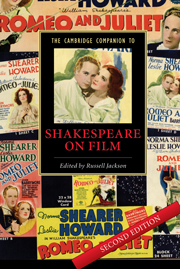Book contents
- Frontmatter
- Introduction: Shakespeare, films and the marketplace
- Part I Adaptation and its Contexts
- Part II Genres and Plays
- Part III Directors
- 9 The Shakespeare films of Laurence Olivier
- 10 Orson Welles and filmed Shakespeare
- 11 Grigori Kozintsev’s Hamlet and King Lear
- 12 Franco Zeffirelli and Shakespeare
- 13 Flamboyant realist: Kenneth Branagh
- Part IV Critical Issues
- Further Reading
- Filmography
- Index
- Series List
9 - The Shakespeare films of Laurence Olivier
from Part III - Directors
Published online by Cambridge University Press: 28 July 2007
- Frontmatter
- Introduction: Shakespeare, films and the marketplace
- Part I Adaptation and its Contexts
- Part II Genres and Plays
- Part III Directors
- 9 The Shakespeare films of Laurence Olivier
- 10 Orson Welles and filmed Shakespeare
- 11 Grigori Kozintsev’s Hamlet and King Lear
- 12 Franco Zeffirelli and Shakespeare
- 13 Flamboyant realist: Kenneth Branagh
- Part IV Critical Issues
- Further Reading
- Filmography
- Index
- Series List
Summary
Olivier made his three Shakespeare films as the result of multiple promptings. Despite uneasiness about his own Orlando in the As You Like It film directed by Paul Czinner in 1936, he became interested in exploring the potential of the cinema for the presentation of Shakespeare’s plays and he managed never to abandon the theatricality implicit in the plays in the films he directed. He was conscious, too, of the different and wider cinema audience to which he would be bringing Shakespeare, and which in the 1940s still retained 'its slight preponderance of women, its heavy working class bias and its very strong “youth” bias'. In the case of his first film, Henry V, there was, of course, also the persuasive power of the wartime Ministry of Information, anxious to promote a film which would boost national morale. This chapter will approach the films in the first instance through the diverse opinions of critics, in particular those of their first reviewers. All Olivier’s films are remarkable for their constant oscillation between the cinematic and the theatrical, and their fusion of the two distinctly different dramatic languages. Not only does this arise from the unconscious instincts of Olivier the film maker, an indication of his claim to be an auteur, but there is, too, a conscious shifting between the elements of the two media.
- Type
- Chapter
- Information
- The Cambridge Companion to Shakespeare on Film , pp. 167 - 186Publisher: Cambridge University PressPrint publication year: 2007
- 1
- Cited by

